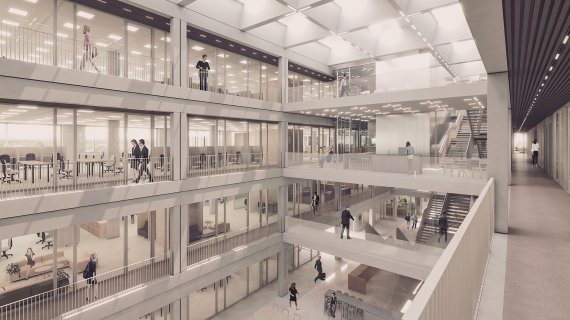The new Plus Ultra II building on the campus brings all aspects of entrepreneurship and knowledge-based companies at WUR together. Sebastiaan Berendse, director of Value Creation at WUR, provides a virtual guided tour.
StartHub Wageningen, the nursery for startups initiated by Wageningen students and PhD researchers will be on the ground floor, with offices and workspace for starters and a large hall for events and courses. ‘We already offer Wageningen students a broad extracurricular programme on entrepreneurship,’ says Berendse. ‘In Plus Ultra II, we want to reach more than 1000 students a year with these courses. Experienced businesspeople will challenge them to be enterprising and explain what running a business entails. The courses are made up of three parts: inspiration, creation, and getting going.’
Starting entrepreneurs rent space in Plus Ultra II. ‘It is not expensive but nor is it free,’ says Berendse. ‘As a businessperson you constantly have to weigh up what is useful for your company and whether you are prepared to pay for it.’ The starters can rent an office or just a desk. They can get support from service providers who also rent space in the building. These include a company that provides advice about subsidies, a patent law adviser and a financial adviser. The starters can also rent facilities in the Fablab, which has a lot of equipment available, including a 3D printer with which the startups can quickly produce prototypes of their products, for a presentation for example.
StartLife has its office close to the starting entrepreneurs. From here it guides the launch and growth of knowledge-based companies in the agrifood and biobased sectors through the Accelerate programme. StartLife has already overseen more than 300 startups, more than half of them from outside Wageningen. ‘WUR attracts entrepreneurs who want to collaborate with Wageningen researchers,’ says Berendse. He expects that student companies will start signing up to the Accelerate programme too.
The student teams for the various student challenges will also get workspace in Plus Ultra II. These could be the teams participating in the Rethink Protein Challenge or the Urban Greenhouse Challenge, for example. Berendse: ‘Those kinds of competition do not lead directly to the formation of a company, but the students do need a good business case to win them. That requires the same way of thinking as starting entrepreneurs need. So StartHub trains them too.’
On the first floor the technostarters will be housed who are already generating turnover with a product on the market. One example is NutriLeads BV, which makes healthy food ingredients and now has 10 people on its staff. It is now housed in Plus Ultra II and is about to make a leap in scale, having gained financing from Shift Invest, an investment company with which WUR works closely. Another example is Surfix, which makes nanocoatings. This WUR spinoff also has about 10 employees and is looking for space to expand. These companies are a good fit with WUR’s ambition to create more robust spinoffs.
The first floor will also be the home of OnePlanet, the collaboration between the Flemish institute Imec, Radboud University, University Medical Centre Nijmegen, and WUR. Imec will work with other companies here, both in open innovation and behind closed doors. OnePlanet’s Experience Centre will display specific innovations, thus giving other tenants ideas. ‘Imec also has a programme à la StartLife for startup companies in Belgium,’ says Berendse. ‘Imec focuses on sensor and nanotechnology, and wants to link that technology with the agrifood domain, together with OnePlanet. Through our network possibilities arise for new spinoffs, in environmental sciences for instance. That cross-pollination should also take place in the Experience Center.’
The second and third floors will house more mature knowledge companies that are beyond the start-up stage and have been selling products or services for a few years.
Leitmotif: value creation
‘We want to support researchers in making the transition from their research to applications,’ says Sebastiaan Berendse. ‘These could also be social products and services. I think Arnold van Vliet’s Nature Calendar is a fantastic way of making knowledge visible and usable. Taste Lessons, a programme in which schoolchildren are introduced to healthy eating, is another nice Wageningen social innovation. The main objective is not to earn money but to add value.’ According to Berendse, the Science Shop and the Wageningen Dialogue Centre will also play important roles in the transformation from knowledge to practice. Another aspect of this is the sharing of equipment and facilities by researchers. For example, WUR rents its ‘shared research facilities’ to third parties, thus working together with companies such as Surfix, Keygene, FrieslandCampina and Unilever. ‘Unilever now places apparatus in WUR buildings, and is going to use WUR apparatus too. When we were inventorying who had what apparatus, we had some nice discussions and Unilever people discovered that they could measure new things with our apparatus. That’s how sharing research facilities can lead to innovation.’

 Illustration: Kadans
Illustration: Kadans